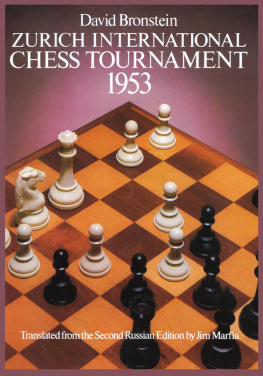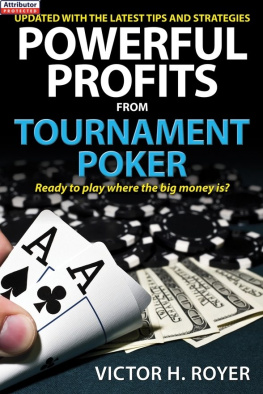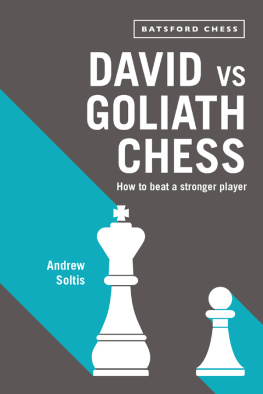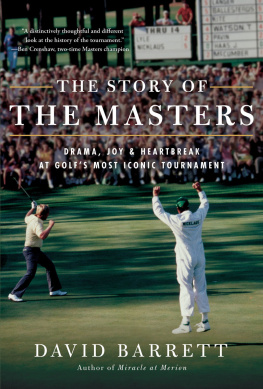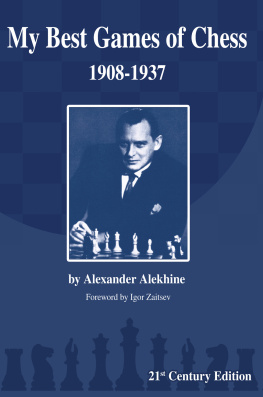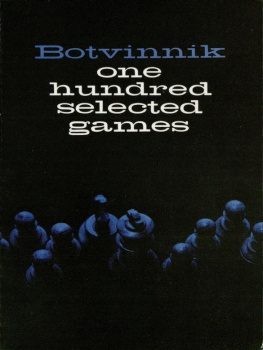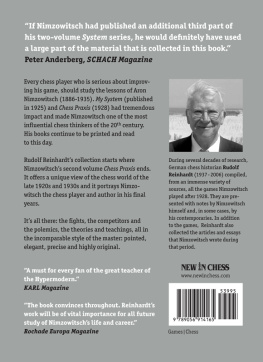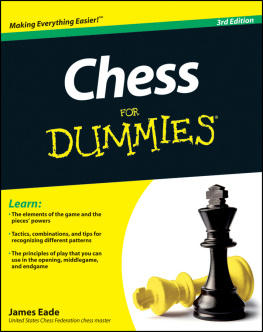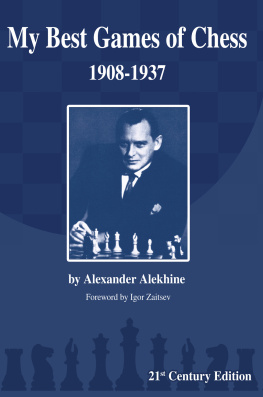ZURICH INTERNATIONAL CHESS TOURNAMENT, 1953
by
DAVID BRONSTEIN
Translated from the
Second Russian Edition by
JIM MARFIA
Dover Publication, Inc
New York
A WORD FROM THE TRANSLATOR
Surely, this is no ordinary chess book that you hold, dear Reader. Myself, I have read chess books that were entertaining, and those that were instructive; some that were historic, and a few that were downright bad. But never have I encountered a book written with such powerful style and such obvious passion for the game.
The passion is infectious. The translation you hold is the final product of ten years work and four revisions and still, I feel that it wanted more effortso you can see the fascination Bronsteins book had for its translator! If my translation can infect you, the Reader, with half of that fascination, then it will be a job well done.
I must thank Jack OKeefe for his meticulous proofreading and priceless editorial work.
Jim Marfia
INSTEAD OF A PREFACE
As I began work on my first chess book, I put myself mentally in the readers place, recalling the excitement with which I used to open each new chess book, hoping to find vital thinking there, clear words, and a wondrous tale of the art of chess. I absorbed a great deal from books, and to this day I cherish the memory of the best of them.
Books about chess tournaments belong to a special class of literature, which would seem at first blush to be rather restrictive of the authors creative possibilities, since he must write, not on themes of his own choosing, but about chess material already created. But this is not quite true. The author is free to treat the games any way he wishes, to make generalizations, and to uncover the ideas and plans actually executed, as well as those that could have occurred in the actual or some other game.
The book of a strong tournament is more than just a games collection. When its participants are the worlds strongest players, then the games are mutually interdependent, and brimming with ideas, which crystallize and develop as the event progresses. Thus, the tournament as a whole represents a step forward in the development of chess creativity. We may take as examples of such tournaments the events at Hastings 1895, St Petersburg 1914, New York 1924, Moscow 1935, and Groningen 1946. Beyond doubt, Zurich-Neuhausen 1953 deserves a place among them.
In working on this book, I started from the premise that every full-bodied game of chess is an artistic endeavor, arising out of a struggle between two masters of equal rank. The kernel of a game of chess is the creative clash of plans, the battle of chess ideas, which takes on its highest form in the middlegame.
This book examines a number of standard positions which occur as a result of the collision of plans; also examined are such strategic concepts as darksquare weaknesses, the advantage of the two bishops, play and counterplay on opposite wings, the relative strengths of the pieces, overprotection, and so forth. Such elements of the struggle as intuition, resourcefulness, and determination are discussed too.
The games of a tournament of grandmasters bring the reader into the creative circle of the contemporary leaders of chess, showing him the rise and fall of battle as well as the manner in which a game of chess is created. It is the authors intention to discourse upon the least explored and most interesting stage of the game: the middlegame, and the way it is handled by today s grandmasters. That is the basic aim of this book.
The author has tried to avoid weighing down his book with variations. Variations can be interesting, if they show the beauty of chess; they become useless when they exceed the limits of what a man can calculate; and they are a real evil when they are substituted for the study and clarification of positions in which the outcome is decided by intuition, fantasy and talent.
Along with this, it was my hope that the player who read this book would raise himself thereby to a rather higher level of playing strength.
The reader will see errors, too, in the games of this tournament; but he will not be too severe in his judgment of the masters if he pictures to himself the peculiar nature of the chess struggle. At the board there sits a living person, with all his everyday thoughts and worries, sometimes far removed from chess. While selecting his plan, or even his next move, he cannot help thinking about his standing in the tournament, remembering yesterday s result, looking at other games. A game is not an analysis: everything must be worked out in ones head, without moving the pieces, without consulting a book or asking advice from anyone The grandmaster thinks and thinks one last look at the clock Time to decide; Ill risk it! and the knight goes to e5. Of course its easy, a whole year later, after studying all of the analyses and spending days on the position, to tell the reader, with absolute certainty: A mistake; the careful Nel was to be preferred
It may be that mistakes will turn up in my analyses and evaluations as well, although I have tried to keep them to a minimum. It is my hope that the reader will be indulgent, and help me to correct them.
It is with trepidation, then, that I submit my work to the judgment of the readers. I will consider my ends achieved if the contents of this book expand the readers chess horizon, increase his mastery of the game, give him some idea of the state of the art, and help him more fully to value and still more to love the depths of chess.
PREFACE TO THE SECOND EDITION
Now that my book is ready for its second edition, I would like to explain today what I had to pass over in the preface to the first edition four years ago. The work I submitted to the readers judgment at that time was a work which had little in common with the commentaries usually seen in the chess press. Rotework is a thing abhorrent to art and literature alike; thus, it should be still less acceptable in chess, which actually falls somewhere in an intermediate zone between art and literature. I do not wish to say anything against the numerous tournament and reference books that are being published, but for some years now a considerable decline has been noticed in the appetite of chessplayers for this type of literature, and yesterdays insatiable demand has slackened. Under these circumstances, how would the public accept a large and unfortunately rather expensive tournament book, such as this one?
I had no wish to become a variations-monger; nor did I want the role of annotator-cum-guide. I felt that the authors ideas and conclusions should form the basis of this book, with the moves played in each game serving to annotate them, as it were. I tried to let the books contents display the richness and limitless expanse of chess ideas, and to let the format resemble that of a literary work.
To judge from all the accepted indicators, the author appears to have accomplished his purpose, at least in part: the book sold out very quickly, and the reviews were favorable. Most valuable to me, however, were the many letters and opinions I received from readers (and I regret not having answered nearly enough of them). There I found, along with justified criticism of my books shortcomings, approval of the basic principles by which it was written. Those letters have been the finest possible reward for my labors, and I should like to take this opportunity to offer my heartfelt thanks to all who wrote me. I should like especially to thank Peter Romanovsky for his detailed review (helpful to readers and the author alike) which appeared in Shakhmaty v SSSR.

